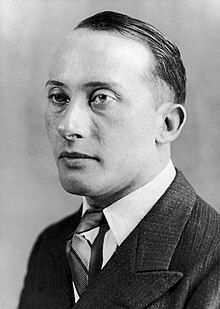Pierre-Olivier Lapie
- View a machine-translated version of the French article.
- Machine translation, like DeepL or Google Translate, is a useful starting point for translations, but translators must revise errors as necessary and confirm that the translation is accurate, rather than simply copy-pasting machine-translated text into the English Wikipedia.
- Consider adding a topic to this template: there are already 6,211 articles in the main category, and specifying
|topic=will aid in categorization. - Do not translate text that appears unreliable or low-quality. If possible, verify the text with references provided in the foreign-language article.
- You must provide copyright attribution in the edit summary accompanying your translation by providing an interlanguage link to the source of your translation. A model attribution edit summary is
Content in this edit is translated from the existing French Wikipedia article at [[:fr:Pierre-Olivier Lapie]]; see its history for attribution. - You may also add the template
{{Translated|fr|Pierre-Olivier Lapie}}to the talk page. - For more guidance, see Wikipedia:Translation.
Pierre-Olivier Lapie | |
|---|---|
 Pierre-Olivier Lapie around 1936 | |
| Minister of National Education | |
| In office 12 July 1950 – 11 August 1951 | |
| President | Vincent Auriol |
| Prime Minister | René Pleven |
| Preceded by | André Morice |
| Succeeded by | André Marie |
| Personal details | |
| Born | (1901-04-02)2 April 1901 Rennes, France |
| Died | 10 March 1994(1994-03-10) (aged 92) Paris, France |
| Political party | SFIO (1945–1958) |
| Other political affiliations | Independent (Social Gaullism) (1959–1994) |
| Education | Lycée Condorcet |
| Alma mater | Sciences Po |

Pierre-Olivier Lapie (2 April 1901 – 10 March 1994) was a French lawyer, politician, writer, and freedom fighter.
Biography
In 1936, Lapie was elected deputy under the Popular Front but was mobilized into service at the outbreak of World War II in 1939. He took part in the Norwegian campaign in February 1940 before joining Free France.[1] He was then appointed Governor of Chad in November 1940, succeeding Félix Éboué.[2] In 1942, he obtained a command in the 13th Demi-Brigade of the Foreign Legion and served in Tunisia and Libya. He was reassigned as a Liaison to Britain in January 1943 before being appointed to the Provisional Consultative Assembly based in Algiers from October 1943 to August 1945.[3]
In September 1945, he was elected a deputy of Nancy to the First Constituent Assembly under the SFIO. In 1946, he was then reelected to the newly created National Assembly where he held several portfolios until an electoral defeat in 1958. He then aligned himself with the Social Gaullists and represented France on various European bodies.
References
- ^ Affinito, Michele; Migani, Guia; Wenkel, Christian (2009). Les deux europes. Peter Lang. pp. 138–144. ISBN 978-90-5201-481-4.
- ^ Grovogui, S. (2016-04-30). Beyond Eurocentrism and Anarchy: Memories of International Order and Institutions. Springer. pp. 131–132. ISBN 978-1-137-08396-8.
- ^ "matchID - Moteur de recherche des décès". deces.matchid.io. Retrieved 2023-09-13.
- v
- t
- e
This article about a French writer of non-fiction is a stub. You can help Wikipedia by expanding it. |
- v
- t
- e











